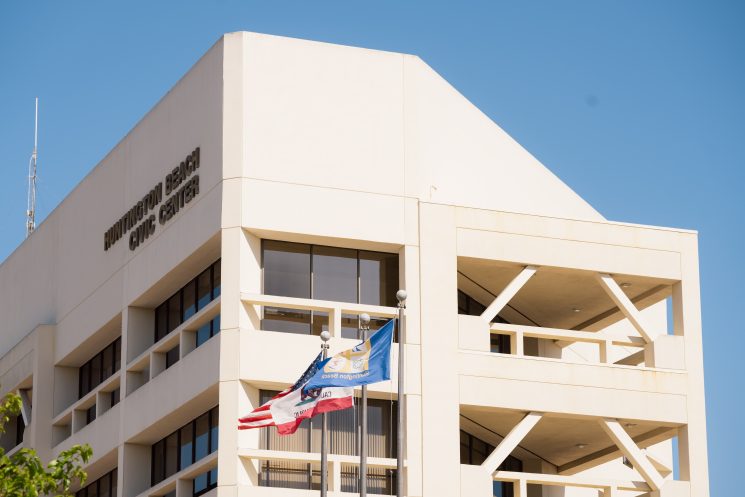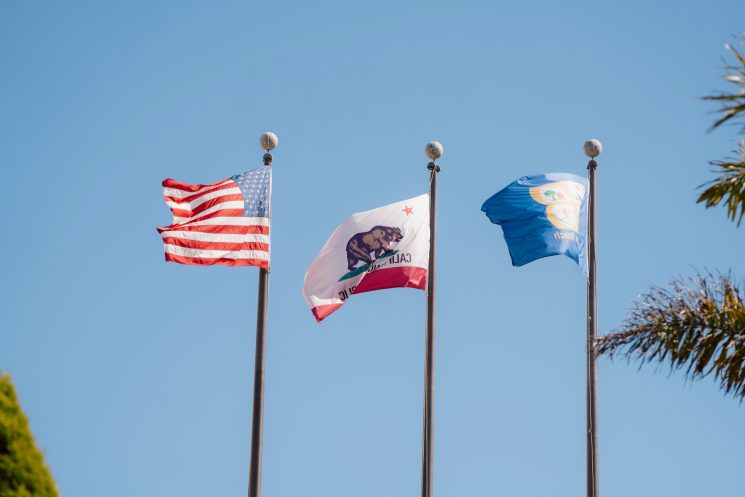
By Reese Meister
Freedom — it always seems to be about freedom. Freedom to not wear a mask, freedom to control what “our kids” read. But what about the freedom of access to information? Even the (what should be) simple freedom to feel safe in your own community?
Unfortunately, the current Huntington Beach City Council’s hypocritical obsession with freedom only applies when it conveniently aligns with their personal desires. The council, led by newly appointed mayor Gracey Van Der Mark, doesn’t seem to recognize how their new policies marginalize groups and individuals within their city. Either that, or they simply don’t care.
All within the past year, the council’s conservative majority, Van Der Mark, Pat Burns, Casey McKeon and Tony Strickland, has voted to remove a portion of the city’s human dignity policy condemning hate crimes, to ban flying the pride flag on city property and to censor books in the public library. Although the other three members voted against these decisions, their opposition unfortunately lacks power among a seven person council.
On Sept. 5, 2023, the council adopted a few changes to the existing Policy on Human Dignity. Like the old policy, the new one says that “everyone should be treated with courtesy and respect,” an admirable expectation; however, it notably excludes the rest of the sentence: “regardless of their racial background, their nation of origin, the religion they practice, their sexual orientation, gender or disability status.”
McKeon attempted to explain the decision with the claim that “every rational person condemns hate,” so a statement isn’t needed for confirmation. However, this assumptive rationale still cannot justify the change. This removal only highlights the council majority’s intentional exclusion of accepting all identities, something that shouldn’t be debatable. An individual’s background, beliefs and perception of themself isn’t up for anyone else to judge or politicize.
Additionally, the new policy removes an entire section that defines and condemns hate crimes. Instead, the council add a statement on how the city will “recognize from birth the genetic differences between male and female” and how “each sex carries and disadvantages that warrant separation during certain activities (ie. sports).”
This language emphasizing biological differences between sexes and separation during activities like sports seems to be the council’s attempt at a not-so-subtle transphobic dog whistle (the act of disguising a political message to target a specific audience).
Is this really coming from the same people who later advise Huntington Beach citizens to “lend [their] voice in support of treating and respecting all people equally”? It seems like the council majority’s demand to “respect” others only extends to interactions with those who fall into the narrow range of identities that they accept, not the entire diversity of individuals residing in the city.
If this wasn’t enough, they also dissolved the city’s Human Relations Committee, whose mission was to “[inspire] and [promote] mutual understanding, respect, safety and the well-being of all in our community through education and engagement.”
McKeon claimed that Huntington Beach shouldn’t waste resources on a committee that does similar work to the Orange County Human Relations Committee.
“The narrow focus on [hate] incidents perpetuates the false narrative that Huntington Beach is a divisive and hateful city,” McKeon said.
However, if McKeon was so concerned about this becoming Huntington Beach’s reputation, why did he choose to disband the committee that actively combats hate incidents and hate crimes? This action only makes the city seem more divisive.

In spite of the 126% rise in “Anti-LGBTQ hate activity” in Orange County from 2021 to 2022, in February of 2023, the city council voted 4-3 in favor of a proposal that bans flying the LGBTQ+ pride flag on city property, which the former city council had began to raise in honor of Pride Month in June of 2021.
“All are equally valued members of our community, and none are to be treated differently or discriminated against,” Councilmember Pat Burns, who created the proposal, wrote in a city council meeting report. “The City of Huntington Beach should avoid actions that could easily or mistakenly be perceived as divisive.”
Burns wrote this as if flying the pride flag, a symbol of diversity and acceptance, encourages discrimination. If the goal of this decision was to avoid division in the community, it was miserably unsuccessful. The only message that a restriction on the pride flag sends is a rejection of individuals’ identities.
Most of the council’s actions are made with this same type of ludicrous logic and shameful intentions. For their proposed “whitewashed revisionist history” calendar (as state senator Dave Min calls it), which initially aimed to replace celebrations like Black History Month and Women’s History Month, a potential theme for November will be “Black Gold Jubilee — Honoring the Discovery of Oil.”
While oil has undoubtedly played an essential role in the development of Huntington Beach, it still doesn’t seem necessary to dedicate an entire month to celebrating the fossil fuels that are harming our planet. Ironically, this would be followed by “Preserving Parks and Nature — Appreciating Huntington Beach’s Ecological Legacy” in December. The same oil that the city council praises is drilled at the direct expense of the ecological landscape they claim to cherish.
In another ironic move, February was named “We Love Our Libraries — Huntington Beach’s commitment to books, reading and learning” month. The following month, the city council voted to continue pursuing a plan to privatize the library, dismissive of many citizens’ concerns. At the meeting addressing the issue, current senior youth services librarian Laura Jenkins voiced worries of changes to the library’s employment that could eliminate “the days of the family librarian who grows with families as their children age.”
Additionally, this past October, the city council voted to impose a board of parents at the Huntington Beach Public Library to review “sexual content” of books to determine which to allow in different age sections. In spite of the five hours of public comment and hundreds of emails overwhelmingly opposed to the idea — not to mention, the librarians who already handle any concerns with books — the council let their personal biases interfere with their obligation to best serve their community.
The council members in favor of the decision brought up concerns that primarily targeted LGBTQ+ themed books, including an adorable picture book called “Grandad’s Pride.” And even if parents do have concerns about their kid reading about a gay grandpa, it’s not their place to restrict what every other kid reads too.
If there are legitimate reasons to move a book to a different section, the current system is already set up to handle it. Any public library user is encouraged to fill out the Library Materials Evaluation form, prompting the library to formally review any books that they receive complaints about; the librarians are in no need of a board of unqualified parents to do their jobs.
“Book banning sets a dangerous precedent,” Councilmember Natalie Moser said. “Once censorship is introduced, it becomes easier to justify the restriction of other materials based on subjective criteria or personal preferences. This slippery slope can undermine the principles of intellectual freedom and potentially lead to further censorship.”
And who exactly benefits from these types of decisions? Certainly not young children struggling to understand their identities, seeking a book that could help them feel less alone. And definitely not the rising number of victims of hate crimes in Orange County in the past year.
“This council seeks to dismantle our city and foment chaos and division. They continue to work to make us smaller, weaker, and more divided,” Moser said in a joint statement with Councilmembers Rhonda Bolton and Dan Kalmick. “They create nothing. They build nothing. They put extremist party level politics over what is actually good for our town.”
It isn’t the city council’s job to interfere with pre-existing efforts to promote inclusivity or with a perfectly functional book review system, especially not at the cost of the people they represent. They need to focus on their actual responsibilities — managing public works, addressing homelessness, etc. — not waste their time on policies that only work to degrade the identities of others.





